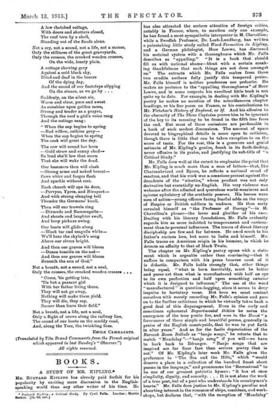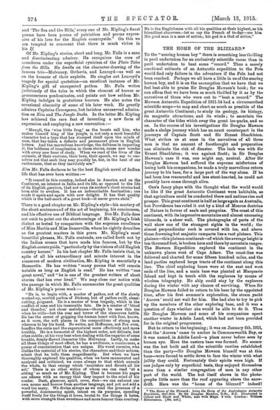BOOKS.
A STUDY OF MR. KIPLING.*
11B, RIIIITAILD KIPLING has already paid forfeit for his popularity by exciting more discussion in the English- speaking world than any other writer of his time. Be • Budyard Kleling • Critical Study. By Cyril Falls, Landau Yartin Backer. [7& ed, mat]
has also attracted the serious attention of foreign critics, notably in France, where, to mention only one example, he has found a moat sympathetic interpreter in M. Cherrillons while a Swedish Professor, Dr. Leeb-Lundberg, has written a painstaking little study called Word-Formation in Kipling, and a German philologist, Herr Loewe, has discussed his metrical system with a thoroughness which Mr. Falls describes as "appalling." "It is a book that should fill es with national shame—blent with a oertain sneak- ing thankfulness that such things are not done amongst ns." The extracta which Mr. Falls makes from these two erndite authors fully justify this tempered praise. Mr. Falls himself is neither ponderous nor pedantic. Ho makes no protein* to the "appalling thoroughness" of Herr Loewe, and in some respects hia excellent little book is not quite up to date. For example, in dealing with Mr. Kipling's poetry he makes no mention of the miscellaneous chapter headings, or his fine poem on France, or his contributions to Mr. Fletcher's History of England, or If. And his allusion to the obscurity of The Three Captains proves him to be ignorant of the key to it, meaning to be found in the fifth lino from the end. But most of these omissions are pardonable in a book of such modest dimensions. The amount of apace devoted to biographical details is more open to criticism, though there is little that can be taken exception to on the score of taste. For the rest, this is a generous and genial estimate of Mr. Kipling's genius, frank in its faultfinding, never effusive in its praise, and justifying its sub-title of " Critical Study."
Mr. Falls does well at the outset to emphasize the point that Mr. Kipling is much more than a man of letters—that, like Cbateaubriand and Byron, he reflects a national mood of reaction, and that his work was a conscious protest against the does,dents of the "nineties," whose product was not only derivative but essentially on•Englieh. His very violence was welcome after the affected and querulous world.wearinesa and epicene upholstery of the aesthetic poseurs. His heroes were men of action—young officers facing fearful odds on the verge of Empire or British soldiers in undress. He thus early revealed himself as "the Professor of Energy"—in M. Chevrillon's phrase—the lover and glorifies. of his race. Dealing with his literary foundation; Mr. Falls evidently regards him as more indebted to temperament and environ- ment than to personal influences. The traces of direct literary discipleship are few and far between. He owed much to bin father's curious lore, but more to India and himself. Mr. Falls traces an American origin in his humour, in which he detect, an affinity to that of Mark Twain.
The chapter on Mr. Kipling's poetry opens with a state- ment which is arguable rather than eonvineing—that it suffers in comparison with his prose because most of it. is didactic. Mr. Falls holds strongly that, other things being equal, "what is born inevitably, must be better and purer art than what is manufactured with half an eye to its own perfection and half upon something exterior which it is designed to influence." The use of the word "manufactured" is question-begging, since it seems to deny impute° to hortatory verse. But hero we most content ourselves with merely recording Mr. Falls's opinion and pass on to the further criticisms in which he virtually takes back a
good deal of this disparagement. Even in the early and sometimes ephemeral Departmental Ditties he notess the
emergence of the true poetic fire, and sees in the Envoi "a forerunner of those simple and beautiful poems, generally in praise of the English countryside, that he was to put forth
in after years." And as for the facile depreciation of the
Barrack Boom Ballads as "banjo songs," be retorts that to match "Mandalay "—" banjo song" if you will—we have
to hark back to Wronger. "Banjo songs that are inspired are far finer fare than serious poetry that is not." Of Mr. Kipling's later work Mr. Falls gives the preference to "The Sea and the Hills," which " would deserve a place in a collection of the hundred finest short poems in the language," and pronounces the "Recessional" to be one of onr greatest patriotic hymns: "ii. has at. once simplicity, dignity, and sonority. . . . It is not alone the work of a true poet, but of a poet who understands his countrymen's
hearts." Mr. Fells dons jnaticse to Mr. Kipling's realism and absorbing interest in the romance of ship; machines, and work- shops, but declares that, "with the exception of 'Mandalay'
and 'The Sea and the Hills,' every one of Mr. Kipling's finest poems have been poems of patriotism and poems expres- sive of his love for the English countryside." On this we are tempted to comment that there is much virtue in his If.
Of Mr. Kipling's stories, abort and long, Mr. Falls is a sane and discriminating admirer. He recognizes the core of soundness under the superficial cynicism of the Plain Tales front the Hills. He dwells on the character-drawing of the famous trio—Mulvaney. Ortheris, and Learoyd—ss well as on the humour of their exploits. He singles out Learoyd's tragedy for special quotation—an excellent instance of Mr. Kipling's gift of unexpected pathos. Mr. Falls writes judiciously of the tales in which the element of horror or gruesomeness predominates, and points out how seldom Mr. Kipling indulges in gratuitous horrors. He also notes the occasional obscurity of some of his later work. He greatly admires Captains Courageous, but lavishes unreserved admira- tion on Kim and Vie Jungle Books. In the latter Mr. Kipling has achieved the rare feat of inventing a new form of expression and employing a new convention :— "Mowgli, the 'wise little frog,' aa the beasts Call him, who makes himself king of the jungle, is not only a most beautiful character but a type that has stamped itself upon the minds of men, that has taken a definite and permanent place in English letters. And the marvellous knowledge, the deftness ha imparting it, the boldness of imagination in these stories, cause new wonder with every new hour of study. When we read of the lives of the animals, of their customs, their laws, their speech, we say to our- selves not that such they may possibly be, but, in the heat of our enthusiasm, that so they inevitably are."
Kin Mr. Falls declares to be the beat English novel of Indian life that has ever been written :--
"It roused in this country, indeed also in America and on the Continent, an interest in India and its life, as opposed to the life of its English garrison, that not even its author's short stories bad boon able to awaken. It hoe an indescribable fascination ; one reads it again and again with new delight. It has that quality which is the hall-mark of a great book—it never grows stale."
There is a good chapter on Mr. Kipling's style—his mastery of the short sentence and of the art of beginning, his conciseness, and his effective use of Biblical language. But Mr. Falls does not omit to point out the shortcomings of Mr. Kipling's Irish dialect as tested by comparison with the supreme excellence of Mies Martin and Miss Somerville, whom he rightly describes as the greatest masters in this genre. Mr. Kipling's moat beautiful phrases, Mr. Falls contends, are called forth not by the Indian scenes that have made him famous, but by the English countryside, "particularly by the visions of old English country houses." In his last chapter Mr. Falls insists that, in spite of all his extraordinary and minute interest in the resources of modern civilization, Mr. Kipling is essentially a Romantic. He has written "many poems that will remain notable as long as English is read." Ile has written "one great novel," and "he is one of the greatest writers of short stories that has ever lived." We may close our notice with the passage in which Mr. Falls enumerates the great qualities of Mr. Kipling's prose work
"He is, to begin with, a master of pathos, not of the slowly worked-up, morbid pathos of Dickens, but of pathos swift, clean. cutting, poignant. He is a master of true tragedy, which is the conflict of man and his inexorable fate. Ile is a master of blood and thunder,' not sheer melodrama—though he uses this too -when he wills—but the roar and terror of the clamorous battle. Ile has the secret of gripping the human heart with fear, knows, as it were, the soft places in the compositions of strong men whereon today his hand. No writer, not Hoffmann, not Poe even, handles the eerie and the supernatural more effectively and more terribly. He is a humorist of the highest order, not delicate, but often subtle; at his very beet when dealing with the vagaries of some lovable, deeply-flawed character like Mulvaney. Lastly, to make all these things of most effect, he has a swiftness, a conciseness, a power of concentration that are unique. His worst enemies, who dislike the material cf his stories, the characters and their action's, admit that he tells them magnificently. But when we have thoroughly explored his qualities, when We have enumerated and analysed and criticised, we come always to that which anneals the whole, to that energy which nourishes and directs au his art.' There is no other writer of whom one can read 'at a sitting' so much as of Mr. Kipling. That is because his pages are aflame with an energy that they impart to the mind of his reader. Dash, glamour, spirit, verve, Alan—we can exhaust our own nouns and borrow from another language, and yet not add a word too many. We divine always as we read the presence of a powerful, domineering spirit, intent on its purposes, spending itself freely for the things it loves, brutal to the things it hates, with more strength than sweetness and mom honour than courtesy. He is the Englishman with all his qualities at their highest, as his friendliest observers—let us say the French of to-day—see him His good man is a man of action; his god is a God of action."



































 Previous page
Previous page